- The House of Representatives voted down a proposal by Rep. Aliyu Missau aiming to expand Islamic law in the 1999 constitution
- Northern lawmakers largely supported the bill, citing benefits for Islamic banking and commerce, while southern representatives opposed it
- Following an intense debate, Deputy Speaker Benjamin Kalu called for a vote, leading to the majority rejection of the proposed amendment
FCT, Abuja - On Thursday, October 24, the House of Representatives voted down a proposed bill seeking to expand the application of Islamic law in the 1999 constitution.
The bill, sponsored by Representative Aliyu Missau, aimed to amend several sections of the constitution by removing the word “personal” from references to Islamic law, thus broadening its potential application beyond personal matters.

Source: Twitter
Missau argued that the current constitutional language limited Islamic law unnecessarily.
He added that it restricted its potential applications in areas such as Islamic commercial law and other fields.
“The 1999 constitution provided for personal Islamic law. The constitution did not envisage the dynamism and development that may come into the country,” Missau argued
Missaw also pointed to institutions like Jaiz Bank, which operates under Islamic commercial law, as examples of how broader application could benefit Nigeria, Vanguard reported.
Reps members divided on regional lines over bill
The proposal sparked intense debate among lawmakers, with support and opposition largely divided along regional lines.
Northern legislators expressed support for the bill, while their southern colleagues were adamantly opposed, citing concerns over secularism and potential constitutional overreach, The Punch reported.
Specifically, Abdul Hakeem Ado from Kano supported the proposed amendment, contending that expanding Islamic law would benefit sectors like Islamic commercial banking.
Saidu Abdullahi from Niger State and Ahmed Satomi from Borno were also in favour, suggesting that Islamic law should not be limited solely to personal matters but should extend to commercial and international law.
In contrast, southern lawmakers voiced concerns about maintaining Nigeria’s secular status and limiting the scope of religious law.
Rep. Bamidele Salam from Osun expressed strong opposition, warning that altering the constitution could fuel religious divisions.
Reps take final decision on bill
After heated discussions, Deputy Speaker Benjamin Kalu, who presided over the session, called for a voice vote.
The majority voted against the amendment, signalling a firm rejection of the proposed bill.
PAY ATTENTION: Сheck out news that is picked exactly for YOU ➡️ find the “Recommended for you” block on the home page and enjoy!
Source: Legit.ng















 English (US) ·
English (US) ·